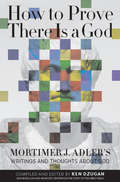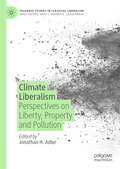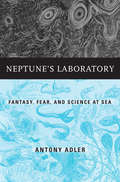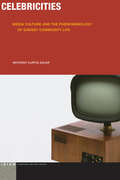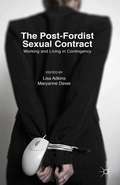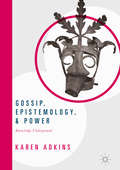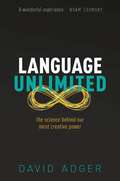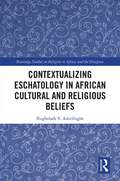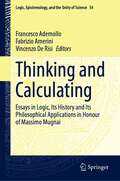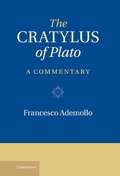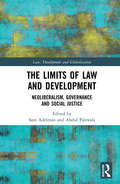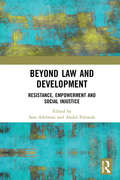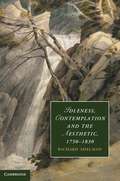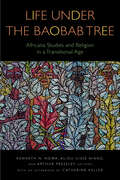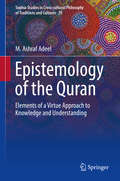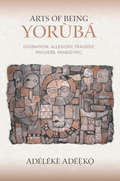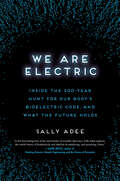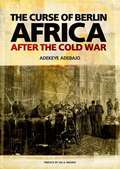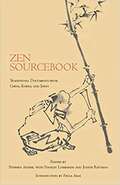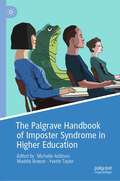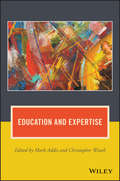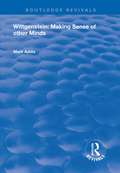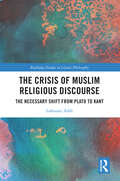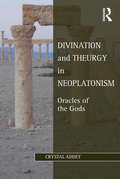- Table View
- List View
How to Prove There Is a God
by Mortimer Adler Ken DzuganOne of the great tasks of Mortimer Adler's illustrious life was his search for a watertight proof of the existence of God. Adler believed that his search had been successful.Adler spent years studying the classic proofs of God's existence, especially Aquinas's Five Ways, and found shortcomings in all of them, as conventionally understood. But he thought that some of them contained ideas which, if properly developed, could be improved, and he continued to search for a satisfying and logically unassailable proof. Toward the end of the 1970s, he believed he had arrived at such a proof, which he presented in his historic work, How to Think about God (1980). In the writings assembled in How to Prove There Is a God, Adler gives us his approach to the question of God's existence in fresh and popular form. He defends his position against critics, both believers and skeptics. The book includes a transcript of one of Adler's appearances on William Buckley's Firing Line, Adler's revealing interview with Edward Wakin, the exchange of views on natural theology between Adler and Owen Gingerich, and John Cramer's eloquent argument that the trend of modern cosmology supports Adler's early struggles with the question of God's existence.
Philosophy Of Judaism
by Joshua AdlerA survey of the sociological and cultural aspects of Judaism in society today.
Climate Liberalism: Perspectives on Liberty, Property and Pollution (Palgrave Studies in Classical Liberalism)
by Jonathan H. AdlerClimate Liberalism examines the potential and limitations of classical-liberal approaches to pollution control and climate change. Some successful environmental strategies, such as the use of catch-shares for fisheries, instream water rights, and tradable emission permits, draw heavily upon the classical liberal intellectual tradition and its emphasis on property rights and competitive markets. This intellectual tradition has been less helpful, to date, in the development or design of climate change policies. Climate Liberalism aims to help fill the gap in the academic literature examining the extent to which classical-liberal principles, including an emphasis on property rights, decentralized authority and dynamic markets, can inform the debate over climate-change policies. The contributors in this book approach the topic from a range of perspectives and represent multiple academic disciplines. Chapters consider the role of property rights and common-law legal systems in controlling pollution, the extent to which competitive markets backed by legal rules encourage risk minimization and adaptation, and how to identify the sorts of policy interventions that may help address climate change in ways that are consistent with liberal values.
Neptune’s Laboratory: Fantasy, Fear, and Science at Sea
by Antony AdlerWe have long been fascinated with the oceans and sought “to pierce the profundity” of their depths. But the history of marine science also tells us a lot about ourselves. Antony Adler explores the ways in which scientists, politicians, and the public have invoked ocean environments in imagining the fate of humanity and of the planet.
Celebricities: Media Culture and the Phenomenology of Gadget Commodity Life
by Anthony Curtis AdlerWhat becomes of life, experience, and truth in the hyperconsumeristic culture of the twenty-first century? What happens to the phenomenological call to go “back to the things themselves” when these things, to an ever greater degree, involve a televised life that is not ours to live, celebrities who are utterly like us yet infinitely untouchable, and uncannily pluripotent electronic gadgets? Combining sustained philosophical inquiry with fragmentary and experimental theoretical interventions, Anthony Curtis Adler rethinks Marxist materialism and the Heideggerian project in terms of the singular experiences of late capitalism. In doing so, he reveals how the disarticulation of life via the commodity fetish demands at once a new notion of phenomenological method and an ontology oriented toward the radical contingency of being itself as transcendental ground.
The Post-Fordist Sexual Contract: Working and Living in Contingency
by Lisa Adkins Maryanne DeverThis collection analyzes shifting relationships between gender and labour in post-Fordist times. Contingency creates a sexual contract in which attachments to work, mothering, entrepreneurship and investor subjectivity are the new regulatory ideals for women over a range of working arrangements, and across classed and raced dimensions.
Gossip, Epistemology, and Power
by Karen AdkinsThis book explains how gossip contributes to knowledge. Karen Adkins marshals scholarship and case studies spanning centuries and disciplines to show that although gossip is a constant activity in human history, it has rarely been studied as a source of knowledge. People gossip for many reasons, but most often out of desire to make sense of the world while lacking access to better options for obtaining knowledge. This volume explores how, when our access to knowledge is blocked, gossip becomes a viable path to knowledge attainment, one that involves the asking of questions, the exchange of ideas, and the challenging of preconceived notions.
Language Unlimited: The Science Behind Our Most Creative Power
by David AdgerAll humans, but no other species, have the capacity to create and understand language. It provides structure to our thoughts, allowing us to plan, communicate, and create new ideas, without limit. Yet we have only finite experiences, and our languages have finite stores of words. Where does our linguistic creativity come from? How does the endless scope of language emerge from our limited selves? Drawing on research from neuroscience, psychology, and linguistics, David Adger takes the reader on a journey to the hidden structure behind all we say (or sign) and understand. Along the way you'll meet children who created language out of almost nothing, and find out how new languages emerge using structures found in languages spoken continents away. David Adger will show you how the more than 7000 languages in the world appear to obey the same deep scientific laws, how to invent a language that breaks these, and how our brains go crazy when we try to learn languages that just aren't possible. You'll discover why rats are better than we are at picking up certain language patterns, why apes are far worse at others, and how artificial intelligences, such as those behind Alexa and Siri, understand language in a very un-human way. This book explores the many mysteries about our capacity for language and reveals the source of its endless creativity.
Contextualizing Eschatology in African Cultural and Religious Beliefs (Routledge Studies on Religion in Africa and the Diaspora)
by Ibigbolade S. AderibigbeContextualizing Eschatology in African Cultural and Religious Beliefs addresses the African consciousness and nuances of eschatological beliefs as part and parcel of the holistic African Indigenous worldviews within the context of the people's traditional heritage. The concept of eschatology is usually explained from the perspective of "endtimes" in relation to either the human individual or the cosmos. Within these contexts, the primary interests, particularly with regard to human eschatology, have centred on the questions of death, afterlife, immortality, destiny, judgment, reward and punishment, and the final destination or eternal "home" of humans. This book explores the characteristic nature, the modes, the process as well as the dynamics associated with the various features culminating the functional expression of the "reality" of eschatological beliefs demonstrated in varied but fundamentally the same subject matter of practices among different African ethnic groups. It also discusses the influences of other religious traditions, particularly Christianity and Islam, on contemporary African eschatological thoughts and their attendant consequences. This book will be of interest to students and scholars of African studies, eschatology, religious studies, and the philosophy of religion.
Thinking and Calculating: Essays in Logic, Its History and Its Philosophical Applications in Honour of Massimo Mugnai (Logic, Epistemology, and the Unity of Science #54)
by Francesco Ademollo Fabrizio Amerini Vincenzo De RisiThis volume collects 22 essays on the history of logic written by outstanding specialists in the field. The book was originally prompted by the 2018-2019 celebrations in honor of Massimo Mugnai, a world-renowned historian of logic, whose contributions on Medieval and Modern logic, and to the understanding of the logical writings of Leibniz in particular, have shaped the field in the last four decades. Given the large number of recent contributions in the history of logic that have some connections or debts with Mugnai’s work, the editors have attempted to produce a volume showing the vastness of the development of logic throughout the centuries. We hope that such a volume may help both the specialist and the student to realize the complexity of the history of logic, the large array of problems that were touched by the discipline, and the manifold relations that logic entertained with other subjects in the course of the centuries. The contributions of the volume, in fact, span from Antiquity to the Modern Age, from semantics to linguistics and proof theory, from the discussion of technical problems to deep metaphysical questions, and in it the history of logic is kept in dialogue with the history of mathematics, economics, and the moral sciences at large.
The Cratylus of Plato
by Francesco AdemolloThe Cratylus, one of Plato's most difficult and intriguing dialogues, explores the relations between a name and the thing it names. The questions that arise lead the characters to face a number of major issues: truth and falsehood, relativism, etymology, the possibility of a perfect language, the relation between the investigation of names and that of reality, the Heraclitean flux theory and the Theory of Forms. This is the first full-scale commentary on the Cratylus and offers a definitive interpretation of the dialogue. It contains translations of the passages discussed and a line-by-line analysis which deals with textual matters and unravels Plato's dense and subtle arguments, reaching a novel interpretation of some of the dialogue's main themes as well as of many individual passages. The book is intended primarily for graduate students and scholars, both philosophers and classicists, but presupposes no previous acquaintance with the subject and is accessible to undergraduates.
The Limits of Law and Development: Neoliberalism, Governance and Social Justice (Law, Development and Globalization)
by Sam Adelman Abdul PaliwalaThe book examines the well-established field of ‘law and development’ and asks whether the concept of development and discourses on law and development have outlived their usefulness.The contributors ask whether instead of these amorphous and contested concepts we should focus upon social injustices such as patriarchy, impoverishment, human rights violations, the exploitation of indigenous peoples, and global heating? If we abandoned the idea of development, would we end up adopting another, equally problematic term to replace a concept which, for all its flaws, serves as a commonly understood shorthand? The contributors analyse the links between conventional academic approaches to law and development, neoliberal governance and activism through historical and contemporary case studies.The book will be of interest to students and scholars of development, international law, international economic law, governance and politics and international relations.
Beyond Law and Development: Resistance, Empowerment and Social Injustice
by Sam AdelmanThe book highlights new imaginaries required to transcend traditional approaches to law and development. The authors focus on injustices and harms to people and the environment, and confront global injustices involving impoverishment, patriarchy, forced migration, global pandemics and intellectual rights in traditional medicine resulting from maldevelopment, bad governance and aftermaths of colonialism. New imaginaries emphasise deconstruction of fashionable myths of law, development, human rights, governance and post-coloniality to focus on communal and feminist relationality, non-western legal systems, personal responsibility for justice and forms of resistance to injustices. The book will be of interest to students and scholars of development, law and development, feminism, international law, environmental law, governance, politics, international relations, social justice and activism.
Idleness, Contemplation and the Aesthetic, 1750–1830
by Richard AdelmanReconstructing the literary and philosophical reaction to Adam Smith's dictum that man is a labouring animal above and before all else, this study explores the many ways in which Romantic writers presented idle contemplation as the central activity in human life. By contrasting the British response to Smith's political economy with that of contemporary German Idealists, Richard Adelman also uses this consideration of the importance of idleness to Romantic aesthetics to chart the development of a distinctly British idealism in the last decades of the eighteenth century. Exploring the work of Adam Smith, Jeremy Bentham, Friedrich Schiller, William Cowper, Samuel Taylor Coleridge, Mary Wollstonecraft and many of their contemporaries, this study pinpoints a debate over human activity and capability taking place between 1750 and 1830, and considers its social and political consequences for the cultural theory of the early nineteenth century.
Life Under the Baobab Tree: Africana Studies and Religion in a Transitional Age (Transdisciplinary Theological Colloquia)
by Shola Adegbite An Yountae Desmond D. Coleman Salim Faraji Rachel E. Harding Minenhle Nomalungelo Khumalo Althea Spencer Miller Pamela Mordecai Rev Canon Hugh R. Page Jr. A. Paige Rawson Nimi Wariboko Sharon Kimberly Williams Catherine KellerLife Under the Baobab Tree: Africana Studies and Religion in a Transitional Age is a compendium of innovating essays meticulously written by early and later diaspora people of African descent. Their speech arises from the depth of their experiences under the Baobab tree and offers to the world voices of resilience, newness/resurrection, hope, and life. Resolutely journeying on the trails of their ancestors, they speak about setbacks and forward-looking movements of liberation, social transformation, and community formation. The volume is a carefully woven conversation of intellectual substance and structure across time, space, and spirituality that is quintessentially “Africana” in its centering of methodological, theoretical, epistemological, and hermeneutical complexity that assumes nonlinear and dialogical approaches to developing liberating epistemologies in the face of imperialism, colonialism, racism, and religious intolerance.A critical part of this conversation is a reconceptualization and reconfiguration of the concept of religion in its colonial and imperial forms. Life Under the Baobab Tree examines how Africana peoples understand their corporate experiences of the divine not as “religion” apart from its intimate connections to social realities of communal health, economics, culture, politics, environment, violence, war, and dynamic community belonging. To that end Afro-Pessimistic formulations of life placed in dialogic relation Afro-Optimism. Both realities constitute life under the Baobab tree and represent the sturdiness and variation that anchors the deep ruptures that have affected Africana life and the creative responses. The metaphor and substance of the tree resists reductionist, essentialist, and assured conclusions about the nature of diasporic lived experiences, both within the continent of Africa and in the African Diaspora.
Epistemology of the Quran: Elements of a Virtue Approach to Knowledge and Understanding (Sophia Studies in Cross-cultural Philosophy of Traditions and Cultures #29)
by M. Ashraf AdeelThis book examines all verses of the Quran involving knowledge related concepts. It begins with the argument that an analysis of the Quranic concept of ignorance points to epistemic virtues that can pave our way towards gaining knowledge and/or understanding. It deals with the Quranic concepts of perceptual, rational, and revelatory knowledge as well as understanding and wisdom in the light of recent discussions in Western analytic epistemology. It also argues that the relevant Quranic verses seem to involve concept of an epistemic conscience whose proper exercise can yield knowledge or understanding. While not overlooking the Quranic emphasis on revelation as a source of knowledge, the book draws our attention to a remarkable overlap between some strains of contemporary virtue epistemology and Quranic approach to knowledge. It shows that the Quranic verses suggest a progressive sequence from propositional knowledge to understanding to wisdom.
Arts of Being Yoruba: Divination, Allegory, Tragedy, Proverb, Panegyric
by Adélékè AdéèkóThere is a culturally significant way of being Yorùbá that is expressed through dress, greetings, and celebrations—no matter where in the world they take place. Adélékè Adék documents Yorùbá patterns of behavior and articulates a philosophy of how to be Yorùbá in this innovative study. As he focuses on historical writings, Ifá divination practices, the use of proverbs in contemporary speech, photography, gendered ideas of dressing well, and the formalities of ceremony and speech at celebratory occasions, Adéékó contends that being Yorùbá is indeed an art and Yorùbá-ness is a dynamic phenomenon that responds to cultural shifts as Yorùbá people inhabit an increasingly globalized world.
We Are Electric: Inside the 200-Year Hunt for Our Body's Bioelectric Code, and What the Future Holds
by Sally AdeeScience journalist Sally Adee breaks open the field of bioelectricity—the electric currents that run through our bodies and every living thing—its misunderstood history, and why new discoveries will lead to new ways around antibiotic resistance, cleared arteries, and new ways to combat cancer. You may be familiar with the idea of our body's biome: the bacterial fauna that populate our gut and can so profoundly affect our health. In We Are Electric we cross into new scientific understanding: discovering your body's electrome. Every cell in our bodies—bones, skin, nerves, muscle—has a voltage, like a tiny battery. It is the reason our brain can send signals to the rest of our body, how we develop in the womb, and why our body knows to heal itself from injury. When bioelectricity goes awry, illness, deformity, and cancer can result. But if we can control or correct this bioelectricity, the implications for our health are remarkable: an undo switch for cancer that could flip malignant cells back into healthy ones; the ability to regenerate cells, organs, even limbs; to slow aging and so much more. The next scientific frontier might be decrypting the bioelectric code, much the way we did the genetic code. Yet the field is still emerging from two centuries of skepticism and entanglement with medical quackery, all stemming from an 18th-century scientific war about the nature of electricity between Luigi Galvani (father of bioelectricity, famous for shocking frogs) and Alessandro Volta (inventor of the battery). In We Are Electric, award-winning science writer Sally Adee takes readers through the thrilling history of bioelectricity and into the future: from the Victorian medical charlatans claiming to use electricity to cure everything from paralysis to diarrhea, to the advances helped along by the giant axons of squids, and finally to the brain implants and electric drugs that await us—and the moral implications therein. The bioelectric revolution starts here.
The Curse of Berlin: Africa After the Cold War
by Adekeye AdebajoThe first Session: The African Union and sub-regional bodies; another on the political, peacekeeping, and socioeconomic roles of the United Nations (UN) in Africa; and a third on Africa's two UN Secretaries-General between 1992 and 2006: The second section of the book focuses on Africa's quest for leadership, and five chapters examine the hegemonic roles of South Africa, Nigeria, the United States, China and France on the continent. The five chapters in the final section of the study analysis Africa's quest for unity, and examine the roles and significance for Africa.
Zen Sourcebook: Traditional Documents From China, Korea, And Japan
by Stephen Addiss Stanley Lombardo Judith Roitman Paula Arai"Featuring a carefully selected collection of source documents, this tome includes traditional teaching tools from the Zen Buddhist traditions of China (Ch'an), Korea (Son), and Japan (Zen), including texts created by women. The selections provide both a good feel for the varieties of Zen and an experience of its common core. . . . The texts are experiential teachings and include storytelling, poetry, autobiographies, catechisms, calligraphy, paintings, and koans (paradoxical meditation questions that are intended to help aspirants transcend logical, linguistic limitations). Contextual commentary prefaces each text. Wade-Giles transliteration is used, although Pinyin, Korean, Japanese, and Sanskrit terms are linked in appendixes. An insightful introduction by Arai contributes a religious studies perspective. The bibliography references full translations of the selections. A thought-provoking discussion about the problems of translation is included. . . . Summing Up: Highly recommended. All levels." --Choice
The Palgrave Handbook of Imposter Syndrome in Higher Education
by Michelle Addison Yvette Taylor Maddie BreezeThis handbook explores feeling like an ‘imposter’ in higher education and what this can tell us about contemporary educational inequalities. Asking why imposter syndrome matters now, we investigate experiences of imposter syndrome across social locations, institutional positions, and intersecting inequalities. Our collection queries advice to fit-in with the university, and authors reflect on (not)belonging in, with and against educational institutions. The collection advances understandings of imposter syndrome as socially situated, in relation to entrenched inequalities and their recirculation in higher education. Chapters combine creative methods and linger on the figure of the ‘imposter’ - wary of both individualising and celebrating imposters as lucky, misfits, fraudsters, or failures, and critically interrogating the supposed universality of imposter syndrome.
Education and Expertise (Journal of Philosophy of Education)
by Mark Addis Christopher WinchThe relevance of expertise to professional education and practice is explored in this collection of original contributions from educationalists, philosophers and psychologists. <p><p> Discusses the increasingly prominent debates about the nature of know-how in mainstream analytical epistemology <p> Illuminates what is involved in professional expertise and the implications of a sound understanding of professional expertise for professional education practice, curriculum design and assessment <p> All contributions are philosophically grounded and reflect interdisciplinary advances in understanding expertise
Wittgenstein: Making Sense of Other Minds (Routledge Revivals)
by Mark AddisOriginally published in 1999, Wittgenstein: Making Sense of Other Minds explores human relations and the issues raised by one immensely influential response to the problems generated by the claims about the existence and properties of other minds. How do we justify the interpretations which we place on other people's behaviour? Is my mind the only real mind? Is there a difference between the way in which I understand m mind and that of another person? This book explores Wittgenstein's theories, critiquing and analysing them, including chapters on the concept of criteria, grammar in the middle and late period, and the blue book and later work.
The Crisis of Muslim Religious Discourse: The Necessary Shift from Plato to Kant (Routledge Studies in Islamic Philosophy)
by Lahouari AddiShowing that Muslim societies are facing a crisis that is more cultural than religious, this book focuses on cultural representations through which social life is experienced in the Muslim world. It brings a new theoretical framework to address the secularization process that is underway and the contradictions it entails. This volume will arouse a new debate on secularization and the relations between religion, culture and philosophy. The crisis Muslim societies are undergoing pertains to the culture and not to the Qur’an to the extent that people do not have access to the sacred in itself but only for oneself, meaning a cultural interpretation of the sacred. The Qur’an in itself is not an obstacle to secularization and modernization since any sacred text is experienced through culture. If we consider the European experience where secularization has first emerged, we see that culture has been transformed from medieval metaphysics to modern philosophy upholding a civic culture. Discussing secularization through cultural representation, this book launches new ideas that fill an important gap in the literature on secularization. It is a key resource for any readers interested in religious studies, philosophy and the anthropology of religion.
Divination and Theurgy in Neoplatonism: Oracles of the Gods (Studies in Philosophy and Theology in Late Antiquity)
by Crystal AddeyWhy did ancient philosophers consult oracles, write about them, and consider them to be an important part of philosophical thought and practice? This book explores the extensive links between oracles and philosophy in Late Antiquity, particularly focusing on the roles of oracles and other forms of divination in third and fourth century CE Neoplatonism. Examining some of the most significant debates between pagan philosophers and Christian intellectuals on the nature of oracles as a central yet contested element of religious tradition, Addey focuses particularly on Porphyry's Philosophy from Oracles and Iamblichus' De Mysteriis - two works which deal extensively with oracles and other forms of divination. This book argues for the significance of divination within Neoplatonism and offers a substantial reassessment of oracles and philosophical works and their relationship to one another. With a broad interdisciplinary approach, encompassing Classics, Ancient Philosophy, Theology, Religious Studies and Ancient History, Addey draws on recent anthropological and religious studies research which has challenged and re-evaluated the relationship between rationality and ritual.
